- Home
- Elizabeth E. Wein
Black Dove, White Raven Page 5
Black Dove, White Raven Read online
Page 5
‘– Who is Mateos?’ Grandma interrupted.
‘Mateos Wendimu – Gedeyon’s brother. Teo’s uncle! He’s an advisor to one of the rases – the royal lords. And Orsino is coming – remember Papà Menotti, sweeties?’
We didn’t actually remember Em’s father – we hadn’t seen him since we’d left France when we were babies. But he still wrote to us and of course we knew who he was, so we nodded.
‘He’ll be stopping in at the hotel tonight,’ Momma said. ‘He and I don’t –’ She swept her beautiful smile over us all like a lighthouse beam without finishing that sentence.
She said, ‘It’s a pretty long walk to the hotel, but I bet you all need to stretch your legs after that terrible wooden train! I borrowed the mule. It belongs to Mateos. There’s so much to tell you!’
From Momma’s letters, we already knew we were going to live with her on a tiny airfield operated by an English socialist and his American wife, the Sinclairs. Momma hadn’t told us much about them except in terms of how handy it was that they had their own generator and fuel tank for their coffee farm. She talked much more about Ezra, the Ethiopian doctor she worked for in the village of Tazma Meda, and about his wife Sinidu, who helped them in the clinic.
‘Ezra is also the local governor,’ Momma told us now. ‘He got his medical degree in Britain, which is where he met Sinclair, and they formed a partnership to organise the local farmers. Sinclair rents his land from Ezra and runs the Beehive Hill Cooperative Coffee Farm. It’s a model progressive community! The clinic is better equipped than we were with the Army Nurse Corps in Italy – we are so lucky in Tazma Meda. Ezra is the only local doctor in the whole country with a European medical degree. It isn’t fair that there aren’t a thousand other Ezras for the rest of Ethiopia! And his wife Sinidu is my favourite person in the whole of Africa. Sinidu is like – she is my best friend.’
Grandfather shook his head, listening and fiddling with his pipe. Momma was his darling and he was used to her wild enthusiasm about people working together for a better life. But her torrent of excitement and information made you feel like you were being swept up in a hurricane.
‘And this summer Ezra and Sinidu and I have been running a flying clinic too, so now we can reach the most remote villages in Ezra’s district! I do the flying and Ezra does the doctoring. Orsino has let me keep the plane that he bought when I was with him in Italian Somaliland. It’s a three-seater Romeo, built to a Dutch design – perfect for us! At least until Sinidu has her own babies it will be perfect, because that will certainly happen sooner or later. I have never seen a man as crazy about his wife as Ezra.’
Grandfather said with a wink, ‘Oh, I’ll bet I have, Rhoda. One who gives his wife an airplane.’
‘Now, Daddy! The plane will also be perfect for me and the kids. And you’ll love Sinidu too – everybody loves Sinidu. She’s the one who taught me to speak Amharic!’
‘Is she going to teach us Amharic?’ Em asked, wide-eyed.
‘The second you meet her she’ll start to teach you Amharic,’ Momma promised. Then she hesitated.
‘But we can’t go back to Tazma Meda right away,’ she admitted after a moment or two. ‘My plane is parked by the aircraft sheds at the race course and I can’t move it till after the emperor’s coronation. Security is very tight there until the ceremonies are over. But that means we’re going to be in Addis Ababa for the whole thing! And Orsino’s really excited about seeing the kids again and Mateos is pretty excited about meeting Teo. There’s an American pilot here too – Horatio Augustus. You remember Horatio Augustus, don’t you, Daddy? He’s that stuntman who did all the parachute jumps over New York City.’
‘Black man?’ Grandfather asked. ‘In a red suit?’
‘The Ebony Eagle,’ Momma corrected. ‘Don’t you make fun of him. He did a lot of stupid tricks to get publicity, but now he’s a high-ranking officer in the new emperor’s air force. He’s teaching young Ethiopians to fly.’
Grandfather fished in his jacket for his pouch of pipe tobacco and looked around as if he were expecting Colonel Augustus to pop out from behind the wooden building. ‘Well, he did wear a red suit!’ Grandfather said. ‘He jumped out of a plane wearing a red suit like a ringmaster and playing the saxophone.’
‘Yes, and I used to hang upside down by my knees from the landing gear, wearing a bathing suit and a silver garter. Ugh!’ Momma reminded him.
‘Thought that stunt was pretty dumb too,’ Grandfather commented, and all the grown-ups laughed.
‘Horatio Augustus still owes me and Delia twenty-five dollars for a parachute ride and his name on our poster. And then, when we were going to do that show on Long Island, he turned up and took our spot at the last minute, and the airfield let him because he’s the famous Ebony Eagle and we were just a couple of girls with babies who shouldn’t be jumping out of planes for a living. But Augustus is a big man now. The new emperor himself asked him to come from the US to pilot for him! And you have to get along with everybody here. The flying community’s tiny.’
‘Augustus get along with Orsino all right?’ Grandfather asked.
‘Honestly, Daddy. No one argues over me. I’m married!’
Grandfather put the tobacco pouch back in his jacket, shaking his head, and bent away from the breeze to try to light his pipe. He and Grandma have always wished that Momma would just go live with Papà Menotti forever.
There was a mule pulling the luggage cart, and Momma lifted Emmy and me on to its back, one at a time, me first. Em rode in front. It was getting dark by the time we left the station and set out through Addis Ababa for the Hôtel de France. You could smell eucalyptus and hear the leaves fluttering in the chilly breeze, but there was also dust and stink everywhere. There weren’t any sewers. There wasn’t any electricity. There was only the one paved road and we were on it. It wasn’t like a modern city at all and it was hard to make sense of in the dark.
‘Scared?’ Emmy whispered.
‘Love it,’ I whispered back, and she laughed.
‘Yes.’
Grandma and Grandfather were trying to be brave.
‘Hope you know where you’re going, Rhoda,’ Grandfather joked hollowly. Grandma hung on to his arm with determination.
‘Guns everywhere,’ she grumbled. I knew she was feeling grim about having to leave us here forever. ‘Everyone is a soldier. And there was that big battle last spring . . .’
‘That was a civil rebellion by traditional lords who resent the modern changes the new emperor made while he was regent,’ said Momma. ‘And he absolutely put an end to that conflict.’
‘And slavery! How could Delia have thought to raise her child – or thy own – in a country that hasn’t yet abolished slavery? When thy own grandmother ran a station on the Underground Railroad?’
‘Why do you think the new emperor has to defeat the reactionaries trying to stick to their medieval rules!’ Momma protested. ‘It’s not like the antebellum South here! There are a boatload of new emancipation laws and no one’s been born into slavery for a decade. People are jumping straight from the Middle Ages to the twentieth century and they’re doing it as fast as they can!’
I was absolutely looking forward to seeing evidence of the Middle Ages – lion skins and spears and treasure. And if there was slavery, maybe me and Em could work for an Ethiopian Underground Railroad in real life.
‘No ruler can afford to let his most powerful landowners go on squabbling,’ Momma continued. ‘Don’t fuss, Mother! A lot of the guns you’re seeing were picked up at the Battle of Adwa in 1896 or even Magdala in ’68! In which case nobody has ammunition that fits any of them. It’s a badge of honour to carry a rifle from Magdala, like wearing a medal.’
She took a breath and went on.
‘Think of the Founding Fathers! We did all this a hundred and fifty years ago. These people are building a new country now. And you will love Beehive Hill Farm. Tazma Meda is the perfect model – there’s a school, the clinic, the coo
perative, and they’re even going to build a radio tower there.’
The big city of Addis Ababa (the name means the New Flower) seemed alien and mysterious and a little deliciously sinister as we made our way across it for the first time. Stars poked through like holes in the cloth of the sky and shed no light on anything. Darkness flooded down winding paths of close-packed stick houses showing an occasional flicker of flame here and there through the gaps in the walls. The thump of the mule’s hooves beneath us, and the murmur of Grandma and Grandfather muttering to each other behind us, began to put me and Em to sleep.
But the hotel was a blaze of light and a buzz of noise in the soft highland blackness. In spite of the weird new city it reminded me of our long-gone life of barnstorming with Momma and Delia, snuggled into a different bed every couple of days. Walking up to the Hôtel de France was like coming home some summer night in the mid-twenties after an air show: everybody a little nervous about the new place, but excited that the show went so well. It felt like that again. I didn’t realise until that moment what I’d been missing.
Neither me nor Em can remember going inside or sitting down. The one thing we agree on is that when we looked around in the bright acetylene light, we’d never seen such a mix of black and white faces in one dining room.
‘Teodros! Emilia! Mia bella cara!’
Papà Menotti was waiting for us. He swept us both into an enormous bear hug. We hadn’t seen him since we left France when we were babies. He cried real tears over Em, even though he couldn’t think of anything to say in English to either of us besides, ‘Well, well, well!’ He had presents for us – a lace veil for Em which is still one of her prize possessions (she wraps herself in it sometimes and wears it instead of a shamma), and a die-cast toy Spirit of St Louis monoplane for me.
He didn’t speak English at all – he talked to Momma in French. He spoke to me and Em by patting us on the head and clapping us on the back and stroking our hair. He ordered big plates of pasta for everybody. It was like being in a restaurant in South Philadelphia. Every now and then he’d take Momma’s hand and hold it quietly, longingly, until she twitched it away from him again.
They are both tall and thin and about the same age. They look like a couple. But Momma doesn’t pretend to be his wife or to be in love with him or act any differently around him than she does with anybody else – she just puts on being married like a flying suit when he’s there. Like her wedding ring, which she never takes off. It’s not because she cares about it. It’s just part of her wardrobe.
Momma had to talk a lot of French that night. The hotel is run by a French couple and we met the Imperial Ethiopian Air Force chief Pierre Ferrand and two other French pilots – all of them here because of France’s support for Ethiopia. We met Mateos, my uncle. He came in late and joined our table, and for a few minutes he sat so quietly we didn’t even notice he was there. (He really has got the trick of invisibility – I wish he could give me lessons. He moves as silently as a hunting cat.) Then after he watched us for a while he leaned across the table to shake hands first with Grandfather, and at last with me. After a moment of hesitation he sized me up, grinned and grabbed me in a full-arm Ethiopian handshake.
I saw in a flash, that I knew him. His smile was exactly like my father’s in the only picture we had of Gedeyon, one of those French airfield album photos, and it was exactly like my own smile too. I was so startled I stood up and jumped backwards into Grandfather’s seersucker and made him accidentally drop his pipe.
Momma leaned forward eagerly, gesturing at all of us around her.
‘My family.’
She repeated it in Amharic so Mateos would understand. She added in English, ‘Teo, this is Ato Mateos, your father’s brother – your uncle. It’s thanks to him I have the clinic job in Tazma Meda. His boss is a railroad official, an Ethiopian who was educated in Europe, just like Ezra, the Tazma Meda doctor. They both studied at the University of Edinburgh. And Ras Assefa, the railroad official, is the brother of the man your father worked for in France. Everybody is connected. I owe so much to so many people!’ Momma beamed.
Then suddenly she started up, half rising from her chair. She’d seen another person come in. We all looked in the direction she’d turned. The man she was looking at threw his cloak to a barefoot bellhop and advanced on our table.
‘RHODA MENOTTI! RHODA MENOTTI AND HER FAMILY!’
It was like being announced by a ringmaster. Heads turned. The speaker was a tall, broad-shouldered black man wearing a sky-blue uniform with gold epaulettes. American and European reporters glanced up at him and watched with interest. The Ethiopians ducked their heads, looking sideways or in the other direction.
I glanced at Mateos to see what he was doing, and he was sitting still and straight in his white shamma cloak, gazing at an empty spot in the corner of the room as if he were sitting by himself. And no one was looking at him.
I sat still and straight across from him with my head tilted down, gazing between Em and Papà Menotti, thinking: Mateos and I are both invisible. None of the rest of us is, but we are.
It was a fantastic trick.
It was easy because the man who had shouted Momma’s name was so incredibly flamboyant.
Grandfather stood up and held out his hand with Drummond determination. He and Colonel Horatio Augustus could not have been more extreme opposites if they were negative film images of each other. Grandfather was all bristling white hair and moustache, in his grey-and-white striped seersucker suit still dust-lined from the train journey. He looked old and frail and pale. He was up to the challenge though.
‘Colonel Augustus, it is a delight to meet you. The Ebony Eagle himself, the man in the flesh! You won’t believe me, but I was in the crowd to see you off in the Abyssinia I in ’24 when you tried to fly to Africa!’ Grandfather gave a bark of laughter. ‘By Jiminy, that show was what I call exciting –’
‘Ah –’ said Colonel Augustus, trying to interrupt, while Momma glared ominously at Grandfather to get him to shut up. Augustus might be loud, impressive and a show-off, but he was just like Momma: leaving behind his old life and starting a new one.
‘Too bad it had to end in the Hudson River,’ Grandfather went on, still pumping Colonel Augustus’s hand enthusiastically. ‘But Colonel, I am one of those supporters who gave you A for Effort. A for Effort! I contributed thirty-five dollars to your fund. Twenty-five by mail and ten when they passed the hat. I did it for Rhoda and her air-circus partner. You remember Delia Dupré and their flying act, Black Dove, White Raven?’
The other people in the dining room were all sitting on the edge of their seats. Grandfather nodded and blew into his moustache. He announced to nobody in particular, ‘Yessir, this man is a real daredevil. I knew then he was going to make it big.’ He turned back to Colonel Augustus. ‘And now look at you – an officer of the Imperial Ethiopian Air Force! It is a thrill to meet you, sir, a real thrill.’
Maybe Colonel Augustus was offended about being reminded of his plane crash, but he wasn’t going to make a fuss when Grandfather said he’d backed him with thirty-five dollars.
‘Sit down, Daddy,’ Momma said, and added with cool and simple welcome, ‘Colonel Augustus, come on and join us.’
Colonel Augustus sat down between me and Em. He clapped me on the shoulder and offered me his hand to shake, grasping my arm like Mateos had done. But Mateos had made it feel like a secret handshake. Augustus made it feel like he was performing a circus act for hundreds of people to applaud.
‘You must be Teodros. Teodros Gedeyon, the Black Dove’s Ethiopian son – welcome to your homeland!’
‘I’m Teo,’ I said cautiously. I hadn’t considered Ethiopia as my homeland yet.
‘Teo’s American,’ said Em.
‘Ethiopian by birth!’ Augustus insisted.
‘I was born in France. I come from Pennsylvania,’ I told him. This made Colonel Augustus laugh.
‘You are, dare I say it again, Ethiopian by birth. The
law is that the child of an Ethiopian father is an Ethiopian citizen. The law that applied to your father applies to you.’
Em turned to Grandfather, who took care of our tickets and passports and telegrams and official stuff like that. ‘Is that true?’ Em asked.
I shot him a desperate look too, silently begging him for adult help.
‘Teo’s American on my passport,’ Grandfather said gruffly. ‘He’s one of us.’ Then he said to Momma, ‘You’re going to have to put Teo and Emmy on your own passport now. You can do it at the legation here.’
‘And has the Black Dove’s talented partner taught you to fly yet?’ Colonel Augustus asked me directly.
‘Jumping cats!’ Em exclaimed. She knew how much I wanted to fly, and also that it was a dangerous topic to bring up around Grandma and Grandfather, so dangerous that we hadn’t even risked telling Connie. ‘Teo isn’t but eleven years old and Momma hasn’t seen us for two years – of course he doesn’t know how to fly!’
‘Emilia!’
Several grown-ups scolded her at the same time for being rude.
But Momma swooped in to rescue us all. She pulled her chair around next to mine. ‘Of course my kids are far too young to learn to fly.’
There was more to it than that. Neither me nor Em had been in an airplane since before Delia died. We were going to have to travel to Beehive Hill Farm in Momma’s new plane; we knew, sure as shooting, that Momma must be worried about that trip, and that Grandma and Grandfather were worried about it too. Even if it was her own plane that she’d been flying around Ethiopia for a year now.
‘I hope that teaching Delia Dupré’s son to fly will be my pleasure some day soon, Mrs Menotti,’ Colonel Augustus said heartily.
‘Teo’s not here to learn to fly,’ Momma said flatly.
There was an awkward silence.
But Colonel Augustus didn’t give up easily. ‘Teodros Gedeyon was born to be a pilot! Wasn’t his mother one of the earliest licensed flyers of her sex and race in the world? Wasn’t his father one of the earliest African men to take to the skies before his untimely death far from home –?’

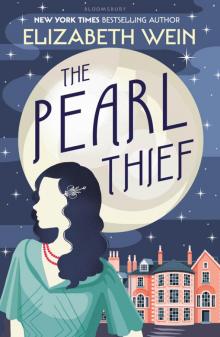 The Pearl Thief
The Pearl Thief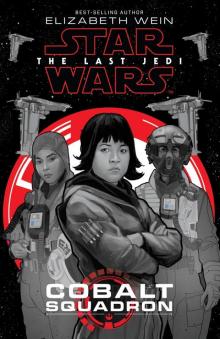 Cobalt Squadron
Cobalt Squadron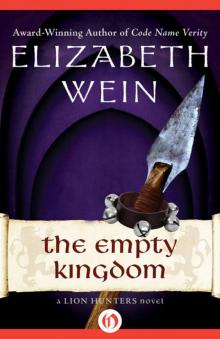 The Empty Kingdom
The Empty Kingdom Code Name Verity
Code Name Verity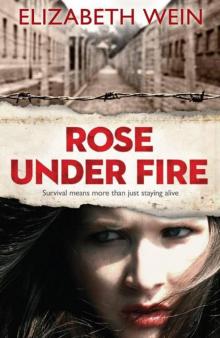 Rose Under Fire
Rose Under Fire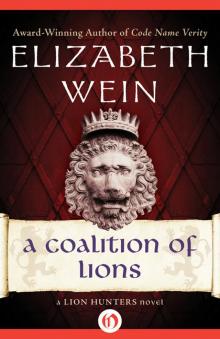 A Coalition of Lions
A Coalition of Lions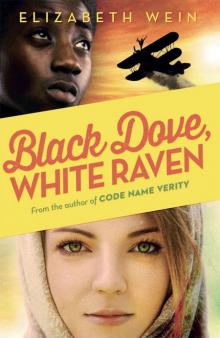 Black Dove, White Raven
Black Dove, White Raven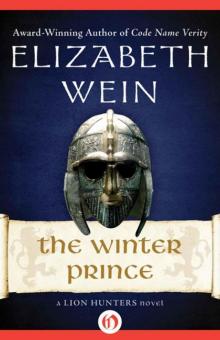 The Winter Prince
The Winter Prince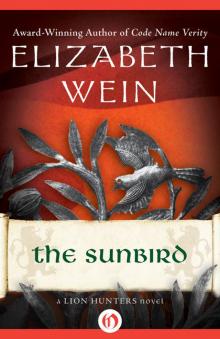 The Sunbird
The Sunbird